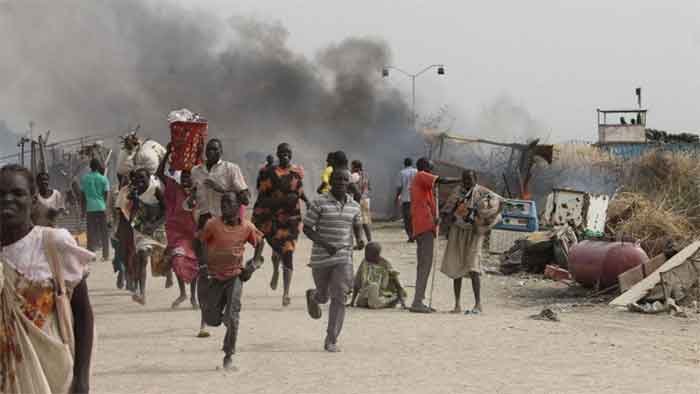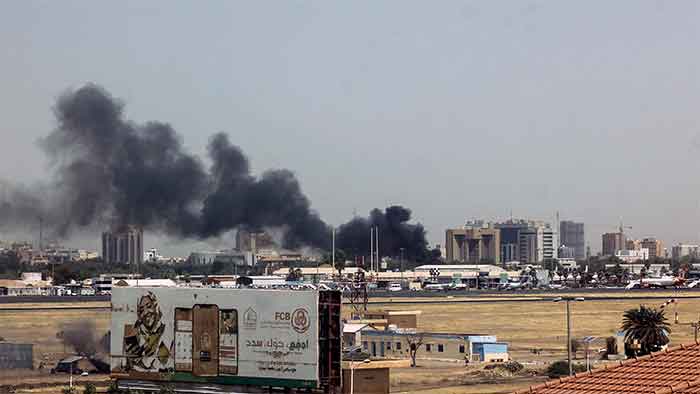
Protesters in Sudan have vowed to escalate demonstrations after the deadliest day since a military coup deposed the country’s civilian-led transitional government last month.
Street clashes again shook Khartoum as internet services returned to Sudan on Thursday, a day after 15 protesters were killed in the bloodiest violence since the country’s October 25 coup.
At least 39 have been killed since the military seized power on October 25.
Other reports cited Sudanese medical sources as more than 100 people were wounded during protests yesterday, including 80 with gunshot wounds “to their upper bodies and heads.”
Resistance committees opposed to the coup have vowed to increase their protests in response to the killings. A senior committee member in east Khartoum told that his group was consulting with other committees “about upping the escalation against the coup.”
Police erected barricades to obstruct the protests in and around the capital.
The UN’s special rapporteur on freedom of association, Clement Voule, called the reports of the use of lethal force against protesters “alarming” and urged the international community to “put pressure on Sudan to immediately stop the repression against civilians and respect their rights.”
Around noon on Wednesday, mobile and phone communications went down across the country in an apparent effort to stifle the swelling demonstrations.
UN High Commissioner for Human Rights Michelle Bachelet said the outages “contravene international law.”
“A communication shutdown means people are unable to call for ambulances to treat injured protesters, families are unable to check on the safety of their loved ones, and hospitals are unable to reach doctors as emergency rooms filled up, to name just a few very real and serious consequences,” she said.
Sudan’s chief of police, Lt. Gen. Khalid Mahdi Ibrahim, denied during a news conference on Thursday that his forces had killed protesters, saying police used only legal methods to contain the protests. Police have said that at least 80 of their forces were wounded, but claimed to have recorded only one civilian death.
Sudanese Lt. Gen. Abdel Fattah al-Burhan seized power on Oct. 25 and deposed the civilian-led government. Burhan and his co-conspirators have defied international calls to reverse the coup. Prime Minister Abdalla Hamdok remains under house arrest, nearly a week after Burhan appointed a new transitional cabinet with himself at the head.
Demonstrations on Wednesday were organised despite a near-total shutdown of internet services and the disruption of telephone lines.
Police on Thursday fired tear gas to disperse anti-coup protesters and tore down makeshift barricades before dozens of demonstrators returned to rebuild them only to face more tear gas.
“Protesters responded by hurling stones at the police,” one of the witnesses said.
The Sudanese military’s move upended Sudan’s fragile transition to full civilian rule, drawing international condemnation and a flurry of punitive measures and aid cuts.
Burhan insists the military’s move “was not a coup” but a step to “rectify the course of the transition” to civilian rule.
Thousands took to the streets on Wednesday in Khartoum and other cities but were met by the deadliest crackdown since the military’s takeover.
The European Union said the “perpetrators of these violations will be held accountable” and that the blackout must “not prevent the world from being informed about human rights violations”.
Bridges connecting Khartoum with its neighboring cities reopened and traffic returned to the streets of the capital.
Last week, Burhan formed a new Sovereign Council, the highest transitional authority, with himself as chief and military figures and ex-rebel leaders keeping their posts.
He replaced members from the Forces for Freedom and Change (FFC), Sudan’s main civilian bloc, with little-known figures.
The FFC is an umbrella alliance that spearheaded the protests which led to the ouster of Bashir in 2019, and its mainstream faction has supported the anti-coup protests of recent weeks.
Since the coup, Burhan has removed clauses referring to the FFC from the 2019 power-sharing deal between the military and the civilians from the bloc.
This week, U.S. Assistant Secretary of State for African Affairs Molly Phee met with the generals and the ousted civilian government in a bid to broker a way out of the crisis.
Phee has called for the reinstatement of ousted Prime Minister Abdalla Hamdok, who is effectively under house arrest.
Burhan has vowed to hold the planned elections in 2023, reiterating to Phee on Tuesday that his actions aimed to “correct the trajectory of the revolution”.
On Thursday, a senior US official said Washington was convinced that Sudan’s military wanted to find a way out of the crisis.
“Everybody, it seems to me, wants to find a way back, which is not the feeling I think you would get from the outside,” said the senior official on Blinken’s plane on a trip to Africa.
“There is a lot of room for finding a way forward.”
The U.S. Secretary of State Antony Blinken said at a Thursday news conference in Abuja, Nigeria, that the U.S. is “deeply concerned by the violence used by the Sudanese military against people engaged in peaceful protest.”
Security forces, including police, also military and the country’s paramilitary forces known as the Rapid Support Forces have faced off with protesters since the coup, trying to stop their marches.
In one instance, video from the protests showed a member of the security forces raising a rifle in the direction of protesters. Blood stained the asphalt on a Khartoum road. Injured and bleeding protesters could also be seen being ferried away by cars from areas of confrontation.
Another video, circulated online, shows protesters standing in an open field before they are dispersed by gunfire into side streets. In one segment, protesters are seen carrying a woman who appears to be shot in the head and unconscious into a nearby home.
UN spokesman Stephane Dujarric said Thursday that the world body strongly condemned the “repeated use of excessive force against peaceful protesters” and renewed calls on “the de facto authorities and the security forces to exercise restraint, and refrain from committing further human rights violations.”
“Freedom of expression and assembly are fundamental human rights afforded to every Sudanese and they need to have the opportunity to express themselves peacefully and without fear of retaliation,” Dujarric said, and called for the release of all detained as a result of the protests since the coup.
Also Thursday, the Sudanese Professionals Association, which is part of the country’s pro-democracy movement, renewed calls for a national strike. It urged people to boycott all government agencies, abstain from paying bills and taxes, and erect roadblocks on the streets. The group also urged protesters not to engage with security forces.
“Let’s work all together to paralyze public life in the face of the criminals of the military council,” it posted on the group’s Facebook page.
Earlier, on a main road in Khartoum, protesters burned tyres and chanted: “The people are stronger, and retreat is impossible.”
Others carried pictures of people killed in previous protests and of Abdalla Hamdok, the civilian prime minister who was put under house arrest during the coup, with the slogan: “Legitimacy comes from the street, not from the cannons.”
Images of protests in towns including Port Sudan, Kassala, Dongola, Wad Madani and Geneina were posted on social media.
Security forces were heavily deployed on main roads and intersections, and bridges across the River Nile were closed, witnesses said.
Military leader General Abdel Fattah al-Burhan has said peaceful protests are allowed and the military does not kill protesters.
Despite pressure from Western states, which have suspended economic assistance, efforts at mediation have stalled, with Burhan moving to cement control with help from Bashir-era veterans.
The UN rights chief on Thursday condemned the Sudanese security forces’ use of live ammunition against peaceful demonstrators, after 15 protesters were killed in the bloodiest day since the October 25 coup.
UN High Commissioner for Human Rights Michelle Bachelet said her office had repeatedly appealed to Sudan’s military and security forces “to refrain from the use of unnecessary and disproportionate force against demonstrators”.
“It is utterly shameful that live ammunition was again used yesterday against protesters,” she said in a statement.
“Shooting into large crowds of unarmed demonstrators, leaving dozens dead and many more injured, is deplorable, clearly aimed at stifling the expression of public dissent, and amounts to gross violations of international human rights law.”















































